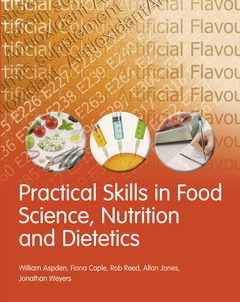Description
Practical Skills in Food Science, Nutrition and Dietetics
Practical Skills Series
Authors: Aspden William, Caple Fiona, Reed Rob, Jones Allan, Weyers Jonathan
Language: English
Subjects for Practical Skills in Food Science, Nutrition and Dietetics:
86.15 €
In Print (Delivery period: 14 days).
Add to cart532 p. · 22x27.5 cm · Paperback
Description
/li>Contents
/li>Biography
/li>Comment
/li>
If you are studying food science, nutrition and dietetics, or a related course, then this book will be an indispensable companion throughout your entire degree programme. This ?one-stop? text will guide you through the wide range of practical, analytical and data handling skills that you will need during your studies. It will also give you a solid grounding in wider transferable skills such as teamwork, using information technology, communicating information and study skills.
Practical Skills in Food Science, Nutrition and Dietetics provides an easy-to-read guide to help you develop the skills you need to succeed. It explains the essential elements of practical techniques and procedures in a step-by-step manner to help you understand their application in the context of food science, nutrition and dietetics.
This text?s unique and comprehensive coverage includes: general advice on practical work; measuring techniques; statistical techniques; analysis and presentation of data; and study skills.
Contents
Study and examination skills
1 The Importance of transferable skills
2 Managing your time
3 Working with others
4 Taking notes from lectures and texts
5 Learning and Revising
6 Curriculum options, assessments and exams
7 Preparing your curriculum vitae
Information technology and library resources
8 Finding and citing published information
9 Evaluating information
10 Using online resources
11 Using spreadsheets
12 Word processors, databases and other packages
Communicating information
13 Organising a poster display
14 Giving a spoken presentation
15 General aspects of scientific writing
16 Writing essays
17 Reporting practical and project work
18 Writing literature surveys and reviews
19 Communicating with the public
20 Client consultation skills
Fundamental laboratory and clinical techniques
21 Your approach to practical work
22 Health & safety
23 Legal and ethical requirements for nutrition & food analysis
24 Basic lab procedures
25 Working with liquids
26 Principles of solution chemistry
27 Working with body fluids
28 pH and buffer solutions
29 Introduction to microscopy
30 Setting up and using a light microscope
The investigative approach
31 Making and recording measurements
32 SI units and their use
33 Scientific method and experimental design
34 Research project work
Analysis and presentation of data
35 Using graphs
36 Presenting data in tables
37 Hints for solving numerical problems
38 Descriptive statistics and surveys
39 Choosing and using statistical tests
Dietary assessment and intervention
40 Nutritional recommendations and guidelines
41 Dietary assessment systems
42 Physical examination
43 Anthropometric measurements and body composition
44 Estimating energy requirements
45 Assaying biochemical markers of malnutrition
46 Testing for food allergies and intolerances
47 Integrating nutritional assessment data
48 Sports nutrition
Analytical techniques in food science
49 Basic physico-chemical techniques
50 Calibration and its application to quantitative analysis
51 Indirect calorimetry
52 Immunological methods
53 Spectroscopic techniques
54 Chromatography
55 Electrophoresis
56 Molecular biology techniques
57 Centrifugation [AND HOMOGENISATION?]
Assaying food components and properties
58 Analysis of biomolecules in foods: fundamental principles
59 Assaying proteins, amino acids and enzymes
60 Assaying lipids
61 Assaying carbohydrates
62 Assaying nucleic acids
63 Assaying active phytochemicals in functional foods
64 Sensory analysis techniques
65 Product development and evaluation
Food microbiology and processing
66 Sterile technique and microbial culture
67 Isolating, identifying and naming microbes
68 Culture systems and quan
William Aspden is Lecturer in Nutrition and Clinical Dietetics at CQUniversity, Australia
Fiona Caple is Senior Lecturer in Food Science and Nutrition and Human Nutrition at Northumbria University, UK
Rob Reed is Pro Vice-Chancellor (Learning and Teaching) at CQUniversity, Australia
Jonathan Weyers is Director of Quality Assurance at the University of Dundee, UK
Allan Jones is Senior Lecturer and Chancellor's Award Fellow in Ecology, Environmental Science and Zoology at the University of Dundee, UK
· Worked examples and "how to" boxes set out the essential procedures in a step-by-step manner.
· Key points highlight critical features of methodology.
· Each chapter is supported by a section giving printed and electronic sources for further study.
· Margin tips, definitions and illustrations appear throughout the text.
· Chapters cover material on study skills such as time management, working with others, note taking, revising, assessment and exams, and preparing a cv.
· Includes material on effective use of the Internet, evaluating information, numeracy and statistics, and advice on how to communicate scientific research and findings.



